|
|
|
Sort Order |
|
|
|
Items / Page
|
|
|
|
|
|
|
| Srl | Item |
| 1 |
ID:
085824
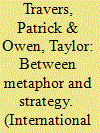

|
|
|
|
|
| Publication |
2008.
|
| Summary/Abstract |
Canada's mission in Afghanistan has evolved considerably. What began as a contribution to operation Enduring Freedom in the aftermath of 9/11 has since transformed into postconflict reconstruction, counterinsurgency warfare, and nationbuilding.
|
|
|
|
|
|
|
|
|
|
|
|
|
|
|
|
| 2 |
ID:
053411
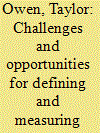

|
|
|
| 3 |
ID:
139915
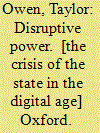

|
|
|
|
|
| Publication |
Oxford, Oxford University Press, 2015.
|
| Description |
x, 248p.Hbk
|
| Standard Number |
9780199363865
|
|
|
|
|
|
|
|
|
|
|
|
Copies: C:1/I:0,R:0,Q:0
Circulation
| Accession# | Call# | Current Location | Status | Policy | Location |
| 058270 | 327/OWE 058270 | Main | On Shelf | General | |
|
|
|
|
| 4 |
ID:
147956
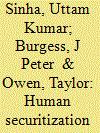

|
|
|
|
|
| Summary/Abstract |
In the large and growing literature on hydropolitics, insecurity generated through water-related conflicts is most often conceptualized under a model of economic resource scarcity. Conflict is generally reduced to the question of who has water, who needs water and thus what cost, in economic, political or military terms, is appropriate to acquiring access to water. This article argues that while such analyses effectively chart the central resource-strategic relations involved in the geopolitics of water, they nonetheless disregard the deeper biological and cultural (that is social, ethnic, religious) significance of water in any water conflict. Such analyses, it claims, are too strongly linked to the traditional (as opposed to human) security discourse and therefore run the risk of misdiagnosing the complexity of the water resource challenge. To respond to this challenge the article will develop a human security ‘metrics’ for analysing water-based conflicts in human security terms. It will then compare an analysis of the Indus Waters Treaty based upon the human security approach with an analysis based on a ‘traditional’ security assessment of the treaty in order to assess the viability of the two approaches. Finally, the article will link the comparative assessments back to the water wars literature, drawing conclusions about its strengths and weaknesses and the possibility of a synthesis of traditional and human security in the analysis of water conflict.
|
|
|
|
|
|
|
|
|
|
|
|
|
|
|
|
| 5 |
ID:
095126
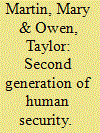

|
|
|
|
|
| Publication |
2010.
|
| Summary/Abstract |
The concept of human security, while much contested in both academic and policy debates, and highly fragmented across different meanings and forms of implementation, offers a potential locus around which global security discourse might converge, particularly in light of current shifts in US security thinking. However, key pioneers of human security, such as the United Nations and Canada, appear to be losing their enthusiasm for the concept, just at the moment when others such as the European Union, are advancing a human security agenda. This article examines the divergence of human security narratives between the UN and the EU. It argues that the UN's use of the concept ran aground owing to a triple problematic of lack of clarity, confusion between previously distinct policy streams on human rights and human development and conceptual overstretch. After assessing the EU experience with the concept to date, the article argues that future use of human security will require greater focus on how it deepens ideas of individual security, rather than treating it as an agenda for broadening security. As well as a need to project clarity on the conceptual definition of human security, there is also a need to associate human security with greater clarity of intent. If successful, this would contribute to establishing second generation human security as a new policy paradigm.
|
|
|
|
|
|
|
|
|
|
|
|
|
|
|
|
| 6 |
ID:
074365
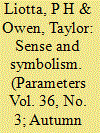

|
|
|
|
|
|
|
|